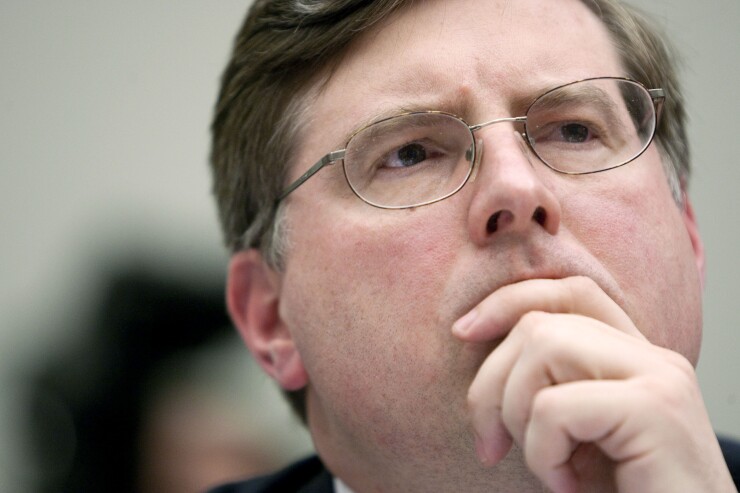FINRA CEO Robert Cook is warning brokerage firms to step up their screening processes and keep their firms free of bad actors and unscrupulous business practices.
In a speech at Georgetown University's business school on Monday, Cook touted FINRA's efforts to prioritize scrutiny of high-risk brokers, hinting more policy changes to that end could come.
"Firms must do their part by, among other steps, reviewing their hiring practices, monitoring their brokers, improving supervisory systems and investigating red flags suggestive of misconduct," Cook said in prepared remarks.
FINRA expanded its program to identify and examine high-risk brokers and the initiative is already yielding dramatic results. Over the past five years, 40% of the firms deemed high-risk are no longer registered with FINRA, Cook said, "in many cases because of regulatory action."
Since FINRA set up its high-risk oversight program in 2014, it has barred close to 120 individual brokers and more than 420 brokers are no longer affiliated with a firm registered with FINRA.
"This heightened scrutiny has had an impact," Cook said.

STREAMLINED DISCIPLINARY ACTIONS
FINRA now maintains a dedicated unit responsible for identifying and monitoring high-risk brokers, which coordinates with field examiners and enforcement attorneys to streamline the introduction of disciplinary proceedings against firms suspected of engaging in misconduct.
In one case last year, FINRA launched an investigation of a broker it ultimately found to be stealing money from a client and barred the individual from the industry just 39 days later.
-
The pro athlete met the adviser through his college business professor, authorities say.
May 30 -
A federal judge issued a restraining order and a temporary asset freeze against the former broker.
March 28 -
The former adviser allegedly pocketed more than $300,000 from trades involving pharmaceutical stocks.
March 21
"These additional resources — which augment the focus on high-risk brokers that continues across the rest of our exam program — should enable us to improve our identification efforts and double the number of examinations we conduct in the program this year as compared to 2016," Cook said.
FINRA is amending its rules to crack down on high-risk brokers. Last month, the board
Cook indicated that more amendments could be coming. One proposal the regulator is considering would establish additional compliance obligations for firms and individuals identified as high-risk, even if no disciplinary action has been initiated.
Wirehouses, broker-dealers and banks unveiled client-friendly policies while asking the agency for further delays.
WEIGHING RISK
The majority of brokerage firms are ethically run, Cook said, adding those shops and regulators have a "shared interest" in purging bad actors from the financial services sector.
Cook promised that FINRA will be publishing additional guidance to help firms understand their compliance obligations regarding high-risk brokers.
"In the meantime," Cook said, "it is imperative that broker-dealers continue to work with us to reduce the risk of misconduct and ensure that investors can have confidence in their investment professionals."
Even while Cook talked tough about the need to crack down on bad actors in the industry, he also acknowledged that there are limits to FINRA's discretionary authority, and, moreover, he stressed the importance of weighing facts and circumstances when analyzing a potential red flag in a broker's history.
"[W]e must consider that not all events — including events disclosed on BrokerCheck — pose the same level of risk," he said. "For example, a broker who has an unpaid lien because of debt accrued due to a medical issue in her family must disclose that lien. That event should not be treated the same as fraud or stealing money from customers."






